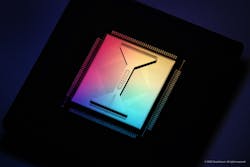Airbus, Quantinuum, and BMW collaborate on fuel cell research with quantum computers
MUNICH - Airbus, BMW, and Quantinuum in Toulouse, France, Munich, and London respectively, announced that they have developed a hybrid quantum-classical workflow to speed up future research using quantum computers to simulate quantum systems, focusing on the chemical reactions of catalysts in fuel cells.
In a new technical paper, "Applicability of Quantum Computing to Oxygen Reduction Reaction Simulations" (available here: https://arxiv.org/abs/2307.15823), the three partners report accurately modeling the oxygen reduction reaction (ORR) on the surface of a platinum-based catalyst. The ORR is the chemical reaction in the process that converts hydrogen and oxygen into water and electricity in a fuel cell and it limits the efficiency of the process. It is relatively slow and requires a large amount of platinum catalyst, so there is great interest and value in better understanding the underlying mechanisms involved in the reaction.
Using Quantinuum's H-Series quantum computer, the collaboration team has demonstrated the applicability of quantum computing in an industrial workflow to enhance our understanding of a critical chemical reaction. The three companies plan further collaboration to explore the use of quantum computing to address relevant industrial challenges.
The research team hopes that understanding the ORR reaction provides insights that help them identify alternative materials that may improve the performance and reduce the production costs of fuel cells. Modeling chemical reactions such as the ORR accurately is an intractable task for classical computers, due to the quantum properties of the chemical mechanisms involved, making such simulations a good candidate to benefit from a potential quantum advantage in the future.
"We can clearly envision the benefits of the study in our quest for sustainable and hydrogen powered alternatives such as the ZEROe aircraft, which may operate on fuel cell engines. The study confirms that quantum computing is maturing at the scale we need for aviation," Isabell Gradert, vice president of central research and technology at Airbus said.
Airbus has identified hydrogen as a promising candidate to power low-carbon aircraft, because it emits no CO2 when flying, when generated from renewable energy. The company previously announced plans to start testing a hydrogen-powered fuel cell propulsion system onboard its ZEROe demonstrator aircraft in the next few years. The company has the ambition to develop the world's first hydrogen-powered commercial aircraft for market entry by 2035.
